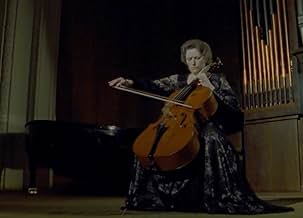D'Est
- 1993
- 1h 47min
VALUTAZIONE IMDb
7,2/10
1054
LA TUA VALUTAZIONE
Aggiungi una trama nella tua linguaA look at life in Eastern Europe after the collapse of the Soviet Union.A look at life in Eastern Europe after the collapse of the Soviet Union.A look at life in Eastern Europe after the collapse of the Soviet Union.
- Regia
- Sceneggiatura
- Star
Recensioni in evidenza
This 1993 film by Chantal Akerman resembles some of her best early experimental work from the 1970s, especially 'Hotel Monterey'. This is a truly non-narrative film. Just a series of images from across Russia; often slow, amazingly long tracking shots (probably made from a car, but somehow rock steady), intercut with some long stationary wide angle shots, and shots of people in rooms, clearly staged. There's no dialogue and almost no music, only the incidental sounds of the place being photographed.
The film is clearly a comment on how lost Russia was at that moment in history after communism fell – a lifetime of one ideology was suddenly gone, and nothing new had yet taking it's place. We see it in the faces - every person looks like they're waiting for something. The only problem for me was the length. At 110 minutes both images and ideas, terrific though they were, started to feel repetitive. That said, I'd gladly re-visit and see if a second viewing, knowing now what the style of the film is, would be easier to settle into, and get lost in.
The film is clearly a comment on how lost Russia was at that moment in history after communism fell – a lifetime of one ideology was suddenly gone, and nothing new had yet taking it's place. We see it in the faces - every person looks like they're waiting for something. The only problem for me was the length. At 110 minutes both images and ideas, terrific though they were, started to feel repetitive. That said, I'd gladly re-visit and see if a second viewing, knowing now what the style of the film is, would be easier to settle into, and get lost in.
Personal "slideshow" album from the director's journey in Eastern Europe and Russia. Well executed; pictures are precisely framed by fixed camera with occasional dolly. (There is only one shot with panning, the shot in a big station) Because nothing happens in a landscape sequence during two hours, the piece is more suitable to be viewed in a gallery or in a public place than in a theater. Conceptually, it is reminiscent of Erik Satie's Furniture Music.
I love movies, but often when watching films it's hard not to feel jaded. There are so many times I've watched a film and found it decent but boring, or even with good movies seen all the places where the director has straight up lifted pieces from other works. What a pleasure it can be then to watch a film from a director like Akerman, someone who doesn't care for the rules of cinema, straight up smashing them for her own pleasure.
D'est is a travelogue, a sort of moving slideshow of images taken as directed by Akerman in Germany, Poland and Russia after the collapse of the Soviet Union. Not that you would know this if you just stumbled across the film. With nothing, not even a title card to explain what is going on, Akerman presents these images of people, sometimes in their own homes, but mostly in public spaces, usually waiting for the bus. There are no markers except the clothing to place us, and little in the way of signage to tell us where we are. There is no narration and the little dialogue said is in various different languages, untranslated. Most of the time what Akerman chooses to show us is people waiting in line for the bus, interacting with the camera by pointing at it or laughing at it, or on various occasions screaming at the camera until it rolls indifferently on. It is like the opposite of everything we are told is cinematic, it is just every day non-actors going about their lives, usually in moments of transition that are likely part of their routine and not something they think about too much. And somehow it is the most cinematic thing of all, to watch these people going about their business.
It is an odd film, completely atypical, but if you surrender yourself to the images you will find yourself in a sort of meditative trance as you contemplate the people and their surroundings as documented by Akerman.
D'est is a travelogue, a sort of moving slideshow of images taken as directed by Akerman in Germany, Poland and Russia after the collapse of the Soviet Union. Not that you would know this if you just stumbled across the film. With nothing, not even a title card to explain what is going on, Akerman presents these images of people, sometimes in their own homes, but mostly in public spaces, usually waiting for the bus. There are no markers except the clothing to place us, and little in the way of signage to tell us where we are. There is no narration and the little dialogue said is in various different languages, untranslated. Most of the time what Akerman chooses to show us is people waiting in line for the bus, interacting with the camera by pointing at it or laughing at it, or on various occasions screaming at the camera until it rolls indifferently on. It is like the opposite of everything we are told is cinematic, it is just every day non-actors going about their lives, usually in moments of transition that are likely part of their routine and not something they think about too much. And somehow it is the most cinematic thing of all, to watch these people going about their business.
It is an odd film, completely atypical, but if you surrender yourself to the images you will find yourself in a sort of meditative trance as you contemplate the people and their surroundings as documented by Akerman.
Chantal Akerman's haunting masterwork is not for those looking for clearly drawn narratives and characters, but for those willing to commit two hours to observation and contemplation, D'EST could be an extremely rewarding experience. There are moments when the poetic minimalism of this perceptive film feels like epiphany, but passive viewers may walk away empty-handed. It could be described as an existential meditation on memory and endurance, and while that may not sound exactly riveting, D'EST is, nevertheless, film-making of the very highest order, a work of art expanding the boundaries of the language of cinema.
Finally... 20 years after being inspired by Michael Snow, Ackerman finally shoots something... Human?
It's just a good documentary, almost pure chronicle of the early 20th century.
The camera work - and I remind you that it has its roots in the film "Central Region" of 1971 - here finally takes shape into something fundamental. This is no longer just a structuralist misanthropic experiment, but a formalized filming style on the level of Dziga Vertov or Peter Hutton.
As a Russian, I can note the shocking size of the queue for public transport. And in general, everything is pretty gloomy after the collapse of the USSR: Square brutal stalls, a complete lack of foreign cars... In general, the chronicle is interesting.
9 out of 10.
It's just a good documentary, almost pure chronicle of the early 20th century.
The camera work - and I remind you that it has its roots in the film "Central Region" of 1971 - here finally takes shape into something fundamental. This is no longer just a structuralist misanthropic experiment, but a formalized filming style on the level of Dziga Vertov or Peter Hutton.
As a Russian, I can note the shocking size of the queue for public transport. And in general, everything is pretty gloomy after the collapse of the USSR: Square brutal stalls, a complete lack of foreign cars... In general, the chronicle is interesting.
9 out of 10.
Lo sapevi?
- ConnessioniFeatured in Women Make Film: A New Road Movie Through Cinema (2018)
I più visti
Accedi per valutare e creare un elenco di titoli salvati per ottenere consigli personalizzati
- How long is From the East?Powered by Alexa
Dettagli
- Data di uscita
- Paesi di origine
- Sito ufficiale
- Lingua
- Celebre anche come
- From the East
- Luoghi delle riprese
- Aziende produttrici
- Vedi altri crediti dell’azienda su IMDbPro
Botteghino
- Lordo Stati Uniti e Canada
- 8540 USD
- Fine settimana di apertura Stati Uniti e Canada
- 564 USD
- 17 apr 2016
- Lordo in tutto il mondo
- 8540 USD
- Tempo di esecuzione1 ora 47 minuti
- Colore
- Proporzioni
- 1.37 : 1
Contribuisci a questa pagina
Suggerisci una modifica o aggiungi i contenuti mancanti





















